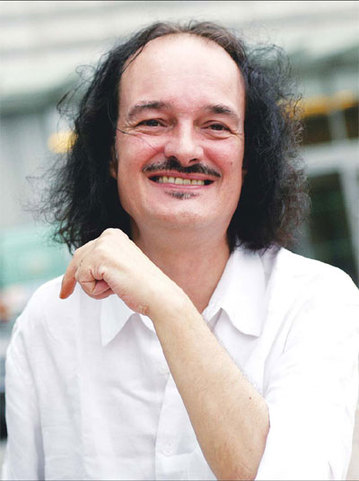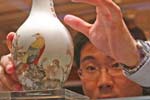People
Great danes
Updated: 2011-04-01 10:29
By Patrick Whiteley (China Daily European Weekly)
Danish culture expert believes modern Chinese can learn a lot from the father of existentialism
 |
|
Danish Cultural Institute director Eric Messerschmidt |
The wheels of modernization are spinning fast, bringing about enormous lifestyle changes to a new generation of Chinese. With so much metamorphosis in such a short period of time, many young people are constantly re-thinking their identity and asking the question: Who am I? Who better to answer the question than the father of existentialism, Soren Kierkegaard, the Danish philosopher, theologian and author, who was born about 200 years ago.
Thanks to the Danish Cultural Institute in China, the works of this great Western thinker are being translated into Chinese allowing this new generation access to a new and important school of thought.
The institute's director, Eric Messerschmidt, believes today's modern Chinese, who are thirsty for new ideas from the West, will relate to the concepts of Kierkegaard.
"We know that Chinese are very fond of classic European thinkers such as Marx and Engels and also because Kierkegaard is a gateway to a number of other very important Western ways of thinking," he says.
"And he is a damn interesting writer - he's not a philosopher in the pure sense. He's actually a writer who uses different pseudonyms to explain his own situation and his life.
"Basically Kierkegaard's approach was that in life you take a position and don't worry about the consequences because you never know the consequences anyway. The consequences of not taking a position are much worse."
Keirkegaard's fame as a philosopher grew in the 1930s because the growing existentialist movement pointed to him as a precursor, although today he is now seen as a highly significant and influential thinker in his own right.
Much of his philosophical work deals with the issues of how one lives as a single individual, giving priority to day-to-day human reality over abstract thinking, and highlighting the importance of personal choice and commitment.
Kierkegaard's impact was profound, influencing Simone de Beauvoir, Albert Camus, Karl Jaspers, Jean-Paul Sartre and Ludwig Wittgenstein just to name a few.
The Danish Cultural Institue's Kierkegaard project in China follows a very successful 2002 Han Christian Andersen campaign in which Messerschmidt coordinated the Chinese leg of the bicentennial celebrations of the fairytale writer.
The Andersen celebrations featured more than 500 activities across China - from acrobatic interpretations of fairy tales to music scores inspired by Andersen's writings - and the impact was tremendous.
The media coverage in China was worth almost half-a-billion yuan, according to Danish Financial Times. "We didn't have time to have a structure so we went to the Chinese, whoever we met, and asked them to do the right thing for Chinese audiences," he says. "And they masterminded it much better than we could have done.
"They really put their marks on the productions and this had a profound impact in Denmark. Danes did not know Andersen had such roots in Chinese education and culture."
The project led to the founding of the Danish Cultural Institute in China, with Messerschmidt in charge. As the institute's director, he now builds bridges between Danish and Chinese partners in creative industries.
When it comes to designing positive things, he has a handy profession to draw from and it was his architectural background that first led
Messerschmidt to the Middle Kingdom. In 2000, the Danish Ministry of Culture selected him to liaise with museums and cultural institutes in an exhibition on architecture in seven cities in China, in connection with the 50th anniversary celebrations of diplomatic ties between China and Denmark. He kept returning, giving lectures and workshops to architecture students.
The then director of the Danish Center for Architecture narrowly lost the bid for designing the CCTV tower to the Dutch company OMA but he stayed on.
In 2002, the Danish Ministry of Culture asked him to promote Hans Christian Andersen in China.
By that time Messerschmidt was married to fellow architect, Guang Mojing, of Mongolian-Chinese descent, and he settled down close to where her parents were in Beijing.
In recent years his organization has become one of the leading European cultural institutes in China helping Chinese better connect to the cultural activities on the continent.
"One of our major activities is to ensure the continuation of the cultural dialogue between China and Denmark, and Europe for that matter, on a high level, which is with the Chinese Academy of Fine Arts and European cultural institutes both in Europe and those operating in China," he says.
"Under the umbrella of the European Union's National Institutes of Culture (EUNIC), we are now into the fourth term of these dialogues - which brings artists, researchers and policy makers together to exchange views and explore where the real cultural differences and similarities lie.
"For instance, German, Austrian and Chinese dramatists are examining how Chinese traditional theatre, Beijing Opera and the classic European opera work.
"They are discovering how actors and performers express different emotions on stage and see, if in anyway, these performance aspects can be handed over to the other side.
"This can lead to the creation of new contemporary expressions, which both sides can share."
Messerschmidt says when the institute was first formed, China's cultural authorities and institutions knew very little about the group but within five years the institute began to tap into a network of local producers, curators and institutions.
He says the role of the institute is not only that of a cultural gateway into Europe for interested Chinese, but also provides Europeans with fresh insight in China.
"I have tried sincerely to communicate to Danes that as Westerners we need to make an effort to understand what authentic China is all about and cater to that," he says.
"This wasn't an easy task, for the Western media has its biases."
He says Peking Opera is a good example of how Europeans are ignorant about modern Chinese culture.
"As it is now, there are few Europeans who have any chance of understanding what's happening in a Beijing Opera but if you attend a contemporary Beijing Opera performance you will see as much existing tradition as you see in modern theater in Europe," he says.
"But in Europe we tend to label Beijing Opera as having its time and now is gone but it is alive and it's a cultural expression that still lives - just go to Chinese theaters and you can tell."
Messerschmidt says cultural institutes from Europe are not political instruments and only have cultural agendas. He says by exchanging views and positions in cultures, different nations can engage in a collaboration on the future.
"If we do not know how to handle the Chinese challenge, we will be unprepared for the future," he says.
"Our mission is to foster an open mind on both sides."
Specials

Share your China stories!
Foreign readers are invited to share your China stories.

Art auctions
China accounted for 33% of global fine art sales.

Waiting for drivers' seat
Lack of sponsorship appears to be why Chinese drivers have yet to race in a Formula 1 event